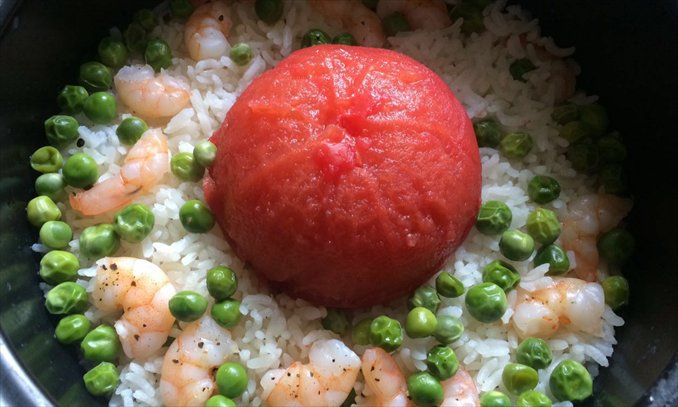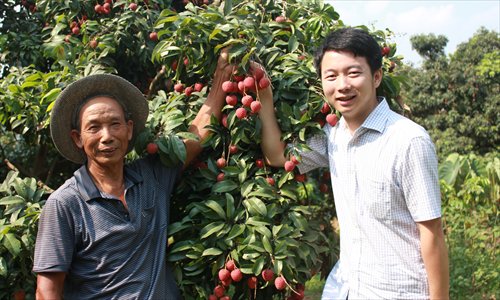Former journalist challenges perceptions of GM foods

Xiang posts pictures of his cooking on Weibo. Photo: Courtesy of Xiang Dongliang

Xiang Dongliang (right) stands with a farmer. Photo: Courtesy of Xiang Dongliang
For the last few months, Xiang Dongliang was only concerned about what to cook each day. He opened a Weibo account and constantly updated it with photos of different dishes and videos of him eating.
On the surface, his Weibo looked no different from any other food blog. But there was one special thing about Xiang's cooking: some of his ingredients were genetically modified (GM).
Xiang, who is a supporter of GM foods, began this project in October amid a swirl of controversy. Debate on this issue began a few years ago in China and has grown increasingly fierce. Xiang hopes he can spread awareness of GM foods through his online demonstrations.
No trusted source
Xiang studied biology in college. When he graduated, he became an agricultural reporter with a newspaper in Guangzhou, South China's Guangdong Province. During this time, many relatives and friends came to ask him whether certain types of food were genetically modified and whether they were safe to eat.
"Many people repeatedly asked me this in different situations, so gradually I came to understand that these questions are of concern to most people, but they don't have a trusted source to get information on this matter," he said.
Xiang believes that with the rise of social media, the controversy surrounding GM foods has been blown out of proportion, causing rumors to start circulating on the Internet. He points to an article titled US announces GM foods to be poisonous as one example. An online search can yield thousands of articles published by different sources but saying exactly the same thing, and such articles have become immensely popular and trusted by many.
This made Xiang uneasy. He said he supports GM foods because of an experience he had a few years ago.
While working as a reporter, he visited a rural area in 2013 when pests damaged about 50 acres of rice paddies near Guangzhou. Farmers told him that because the number of pests was so great, pesticides were having very little effect on them.
That made Xiang think that if farmers had planted crops that were genetically modified to be resistant to pests, they could have avoided losing everything.
Right now, the people who are against GM foods express concern such materials might hurt one's health, and the negative effect might not be present now, but will last for generations.
To this, Xiang says he is a firm believer that GM technology is safe and should never stop advancing. He said that in some people's eyes, GM foods should be banned and this technology should just stop. He believes that goes against the direction that society is heading in.
Starting the project
At first, Xiang wanted to shoot a documentary to tell people that GM food is harmless. He had been inspired by the American documentary Super Size Me, in which the director ate fast food for 100 days to demonstrate the harm it could have on people. In the end, he gained weight and became extremely unhealthy.
Due to financial constraints and other concerns, Xiang eventually chose to cook for 100 days using GM ingredients.
"It's difficult to convince others to believe you just through verbal persuasion," he said. "I needed to show them through action."
In August, he quit his newspaper job and devoted himself to this project. He started looking for GM foods in the supermarket, but found only three things labeled as GM: papaya, cooking oil and one type of salad dressing.
He then met with GM research teams at the Huazhong Agricultural University and Chinese Academy of Agricultural Sciences, who provided him with 100 kilograms of GM rice and 25 kilograms of GM corn powder, respectively. The ingredients had already been awarded safety certificates by the government but had not yet been sold commercially.
Xiang's project soon turned into a culinary display. Every day, he posted recipes, such as tomato rice, corn and mushroom pie, as well as scientific facts about GM foods, to try to reach out and educate the audience.
Lasting impact
Xiang's efforts resulted in a backlash and malicious comments. Many said he was probably taking money from GM companies to conduct such experiments. Some even said they hoped he would suffer as a result of eating GM foods and not be able to have children as a result.
The reaction of the people on Weibo was a microcosm of the controversy surrounding GM foods in Chinese society.
In the past few years, the controversy around GM food initially involved only experts and intellectuals. But gradually, it developed into an Internet-based debate with the entire public participating, sometimes calling each other names and reacting irrationally.
Cui Yongyuan, a former CCTV host, is a major influence in these debates. He is a firm opponent of GM foods and went to the US on a self-funded trip to investigate the matter, filming a documentary about the negative effects of GM foods.
Cui even commented on Xiang's project, saying on Weibo that it was illegal for him to cook with such ingredients, with many supporters agreeing to his point of view, flaming controversy around the project once again.
But Xiang has found there are people whose minds have changed by his demonstrations, including his own family members. He's also been invited by people to give lectures on GM food, sometimes to audiences that number in the hundreds.
Xiang completed his project in December, but he hopes to do more in the future.
"Even though the project is over, I'll keep eating GM food for the rest of my life," he said.
Newspaper headline: Recipe for change